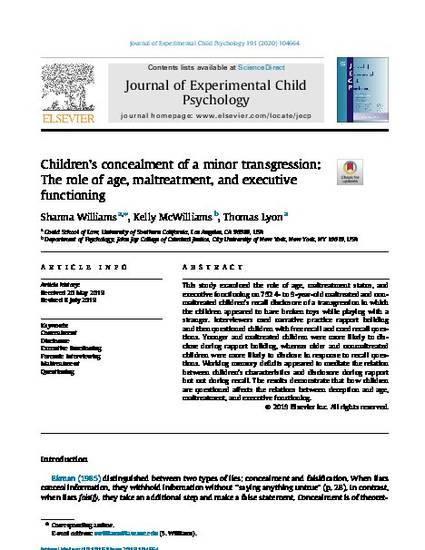
Article
70. Children’s concealment of a minor transgression: The role of age, maltreatment, and executive functioning.
Journal of Experimental Child Psychology (Published 2020)
(2019)
Abstract
This study examined the role of age, maltreatment status, and executive functioning (EF) on 752 4- to 9-year-old maltreated and nonmaltreated children’s recall disclosure of a transgression in which they appeared to have broken toys while playing with a stranger. Interviewers used narrative practice rapport-building and then questioned children with free recall and cued recall questions. Younger and maltreated children were more likely to disclose during rapport-building, whereas older and nonmaltreated children were more likely to disclose in response to recall questions. Working memory deficits appeared to mediate the relation between children’s characteristics and disclosure during rapport, but not during recall. The results demonstrate that how children are questioned affects the relations between deception and age, maltreatment, and executive functioning.
Keywords
- child abuse,
- child sexual abuse,
- child witness,
- child testimony,
- minor transgression,
- children's concealment
Disciplines
Publication Date
Summer July 11, 2019
DOI
https://doi.org/10.1016/j.jecp.2019.104664
Citation Information
Williams, S., McWilliams, K., & Lyon, T.D. (2020). Children’s concealment of a minor transgression: The role of age, maltreatment, and executive functioning. Journal of Experimental Child Psychology, 191, 104664.
